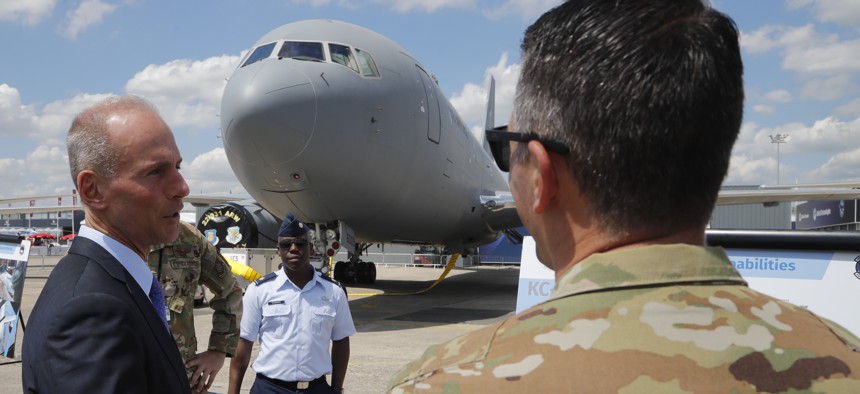Boeing Tankers Still Have Debris; Fix is ‘Months, Maybe Longer’ Away
But the Air Force is once again accepting aircraft so that new inspection processes can be brought to bear, acquisition chief Roper says.
LE BOURGET, France — Boeing executives didn’t want the international debut of their KC-46 Pegasus to take place amid questions about why the U.S. Air Force is still finding debris inside the new aerial tankers.
But not far away from the gray KC-46 parked on the flight line here at the Paris Air Show — one of 11 that have been accepted by the service — Air Force acquisition head Will Roper was still talking about the need for extensive cultural changes on Boeing’s assembly lines.
“This is not something that you fix by sending out a memo,” Roper said Monday during a briefing here.
The much-delayed KC-46 program took an unsettling turn in January when Boeing finally began delivering the planes. Behind wall panels and under the floors, airmen found tools, trash, wire ties and nuts, Roper said. In February, the Air Force stopped accepting the planes from Boeing. They started taking them again in March, then stopped again when inspectors found more debris.
Now the Air Force is accepting “one and change” KC-46s per month as debris-plagued planes make their way down the assembly line — and officials anxiously wait to see whether new inspection processes work, he said.
In the meantime, Roper said, debris has been found inside dozens of tankers in various states of assembly at Boeing’s plant in Everett, Washington.
“We expect all of them are going to have foreign object debris,” or FOD, he said. “As we go through and we’re doing sweeps, we’re finding FOD in the planes.”
Boeing officials are trying to figure out how and where this debris is making its way into the planes.
“It was unacceptable,” Leanne Caret, the CEO of Boeing Defense, Space and Security, said Monday, when asked about it. “Our customers deserve better than that. I have personally apologized to our customers and I have given them my personal assurances…in every aspect of our business, this will not happen again.”
Boeing CFO Greg Smith said the debris found inside the tankers have prompted company executives to look beyond the tanker to other projects.
“Finding out exactly what took place, how it took place, where we had opportunities to improve and sharing them across the business and putting an enterprise priority on this,” Smith said. That’s what we’ve been focused on since these findings have been identified.”
Roper said he expects improvements in the quality-assurance inspections that are supposed to occur at every station on the assembly line. He also said that the Air Force is going to have to accept yet more KC-46s that likely contain FOD so that the improved production-line processes can be brought to bear.
“As those airplanes flow forward down the line, we think it’s going to take some time for the new quality assurance inspection processes to start early enough so that airplanes will flow that are FOD-free,” he said. “It’s not the way we want to get airplanes into the Air Force, but it’s what we’re going to have to do in the meantime.”
Roper said he’ll know whether the effort is working if the types and amounts of FOD decreases.
Air Force officials said that their KC-46s are safe to fly, but some must return to Boeing for additional inspections.
“They have good [quality assurance] practices, they’re just not following them,” Roper said.
For instance, when assembly line workers use a tool, they are supposed to log it out of the tool box, then log it back in when they’re done using it. If a tool goes missing, the assembly line is supposed to stop until it’s found.
“Those kinds of practices have to be followed,” Roper said. “We follow them on the flight line…we expect the same on the production line.”
Boeing should reward an assembly line worker who shuts down the production line, Roper said.
“I’m happy with Boeing’s leadership and their response to FOD,” he said. “We’re going to be talking about this for months, maybe longer because culture does not fix easy.”
Since the problems are cultural, Roper said it could take months, or longer to fix.
“They have characterized it as embarrassing … and they admit that they have some kind of cultural issue that all organizations like that go through, even the Air Force,” Acting Air Force Secretary Matt Donovan said Monday, speaking alongside Roper. “When we run into issues like that, sometimes we have to take a pause and reset and make sure everybody is all aligned on the same page of music.”
Air Force officials will continue FOD inspections of every new plane indefinitely.
“They go through the airframe from tip to tail,” Roper said. “If any foreign object debris is found, the inspection starts again. That continues until the airplane is clean.”
The inspections are slowing down deliveries. The Air Force had wanted Boeing to deliver three planes each month. Right now, it’s getting “one and change” each month, Roper said.
“We’re not going to be pushing on a faster delivery schedule in a way that would put the rigor of the inspection at risk. We’re just going to have to stay focused.”
Air Force officials defended bringing a KC-46 to Paris amid the FOD issues.
“KC-46 is a great capability,” Donovan said. “It really is a great airplane. What we’re talking about here are sort of minor things when you take a look at the whole capability of the airplane.”
The KC-46 troubles come amid the global grounding of the 737 Max, Boeing’s newest commercial airliner, which is believed to have faulty flight control software responsible for two crashed that killed 346 people. The 737 Max is made at a different Boeing factory near Seattle.




